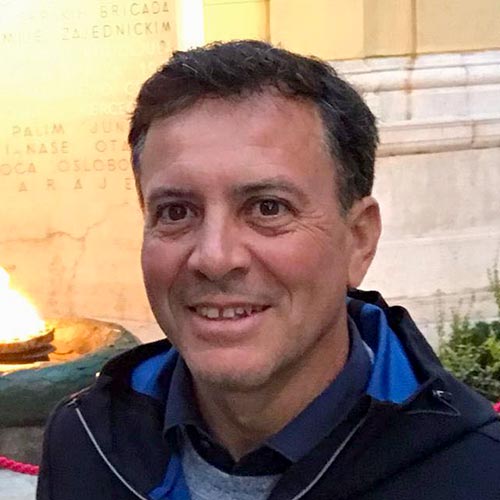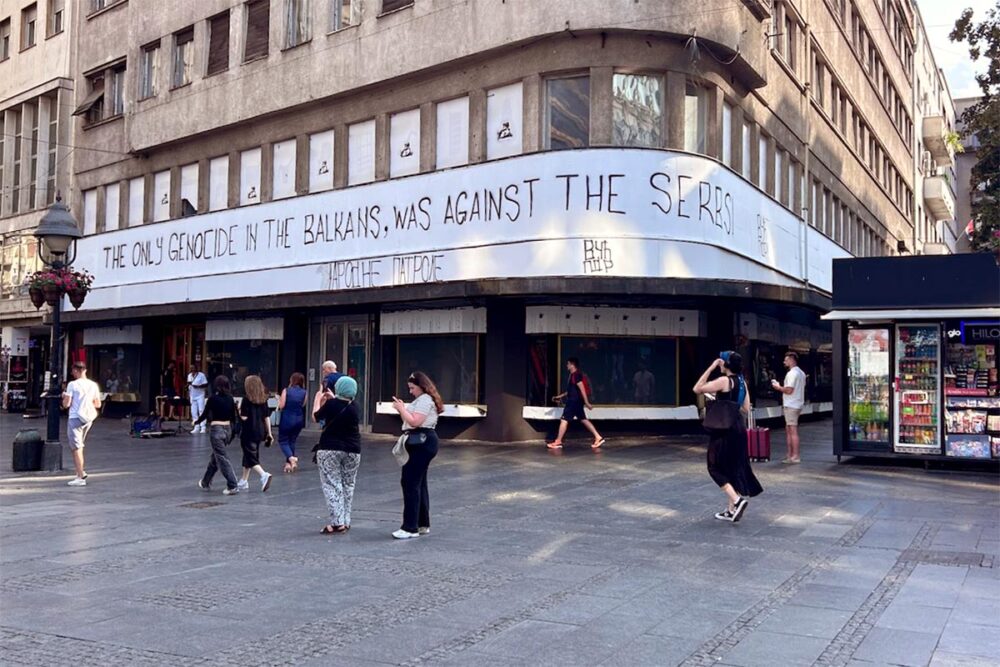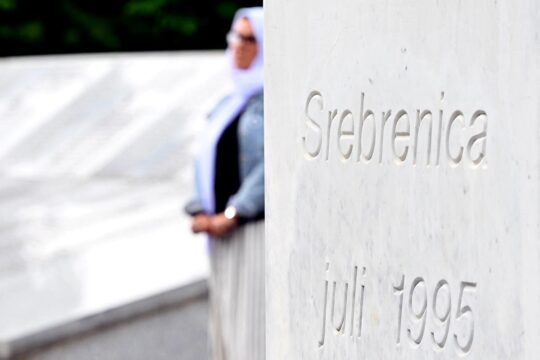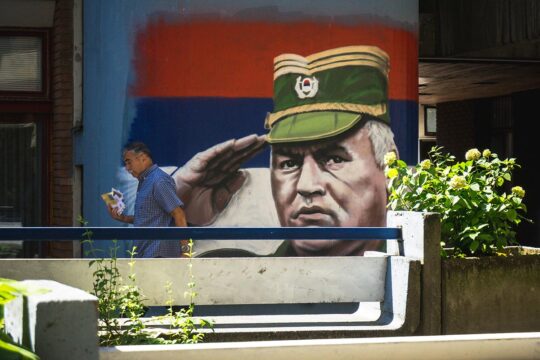“The only genocide in the Balkans, was against the Serbs”: the large graffiti popped up in the center of Belgrade in June 2024. It was signed by the Narodna Patrola (People’s patrol), a far-right organization group, but since then nobody removed it and in fact it was recently repainted. The graffiti reflects a belief which is common in Serbia and implicitly endorsed by parties in power. The issue of the responsibility for war crimes during the conflicts of the 1990s and in particular, the acknowledgement of the genocide in Srebrenica in 1995, remain a sensitive topic for many persons in Serbia, and the role of the authorities in power has often been that of fuelling tensions rather than defusing them. A couple of recent examples, revolving around Srebrenica can easily illustrate this common approach in the country.
“We are not a genocidal people!”
“Can’t you see what they’re doing to us? With that resolution! We are not a genocidal people!” the tone of the elderly lady, an old acquaintance living in Belgrade, is both agitated and upset. The days before the adoption in May 2021 of the UN General Assembly resolution designating 11 July as the International Day of Commemoration of the Srebrenica genocide were filled with discussions like this one. The draft resolution had been amended to explicitly exclude the concept of collective guilt of an entire people, I added. “Oh yes! And you believe what they write in these documents…” She launched into a series of recriminations against the international community, trotting out arguments that seek to portray the Serbian people as victims of an international conspiracy.
In May 2024 in fact, as the voting was approaching, both in Serbia and in Republika Srpska, one of the two entities of Bosnia and Herzegovina with an ethnic Serb majority, an intense media campaign was ongoing against the adoption of the resolution. The key message was “mi nismo genocidan narod”, which could be translated as “we are not a genocidal people”. The campaign by the Serbian authorities, both in the region and abroad, was relentless.
From ordinary people to the media to institutions, the message was repeated incessantly and regularly relaunched by the Serbian and Republika Srpska authorities: the Serbian president himself on his Instagram profile posted a video, on behalf of Serbia and Republika Srpska, with rather disturbing tones, reiterating “We are not a genocidal people. We remember…”
The campaign covered the most important buildings in Belgrade, such as the new Belgrade Tower, the futuristic Beograd na Vodi building, which displayed the same message on its huge, illuminated screen: “We are not a genocidal people”. The same words were later on taken up by the Serbian Orthodox Church, which ordered all churches to ring their bells at noon on the day the Resolution was adopted, and the patriarch himself called on the faithful to show tolerance and firmness against the unjust accusations levelled at the Serbian people. Graffiti and banners appeared throughout the city in a clearly coordinate effort.
The attempts by the Serbian diplomacy and the main political figures at countering the resolution were closely followed by the press in the country, in large part under the influence of the leading parties. At the forefront were the tabloids, whose headlines ranged from “Serbs are not a genocidal people” to “The fight against the powerful” and “The difficult battle for Serbia and the Serbian people”. The tabloids were also joined by Politika, a long-standing Serbian daily newspaper, in an article entitled “German revenge on the Serbs”, which explained that Germany’s sponsorship of the resolution on Srebrenica was nothing more than the latest example of German revanchism towards the Serbs, which began in the 1940s. The day before the UN vote, Serbian Radio Television scheduled a prime-time documentary on the “unpunished crimes”, i.e. the crimes committed against Serbs in the Srebrenica area.
A “moral victory” over the UN resolution
President Aleksandar Vučić travelled to New York for a full-blown diplomatic offensive in an attempt to block the resolution. In an emotional message posted on Instagram, Vučić promised to do his best to defend the Serbian people. Foreign Minister Marko Đurić, in a comment on Politico, explained how the resolution would serve to increase divisions in the Balkans rather than promote reconciliation.
The day of the vote at the General Assembly, Vučić concluded the session wrapped in the Serbian flag. Eventually the resolution was adopted with 84 votes for, 19 against and 68 abstentions. The surprise of the day was the large number of abstentions, a clear result of the diplomatic offensive by the Serbian leadership, who, upon their return home, were able to present the mission as a paradoxical success, given that the Serbian people have not been labelled “genocidal” (not least because such a label does not exist).
The front pages of the tabloids and Politika on 24 May were celebrating, unsurprisingly, a “moral victory” despite the defeat. In the centre of Belgrade on the evening of the 23rd, a “spontaneously” organised procession of cars with Serbian flags paraded through the streets. It is unclear whether they were celebrating the legal defeat or the moral victory.
Krstić’s admission of the Srebrenica genocide
The drama about the Srebrenica Resolution is in stark contrast with the silence accompanying Radislav Krstić’s letter to the Mechanism for International Criminal Tribunals (MICT). In November 2024, a handwritten letter by Krstić, a former Bosnian Serb army general, was circulated in which he admitted to being one of the perpetrators of the Srebrenica genocide and to thinking about the victims and their families every day. The letter was presented in support of a request for early release.
Krstić was arrested back in 1998 and was the first defendant to be convicted for aiding and abetting the genocide in Srebrenica. Krstić, now 76, is currently serving a 35-year prison sentence. The letter, dated 18 June 2024, was written a few days after the United Nations General Assembly adopted the resolution on the Srebrenica genocide. It became public only in November, when Krstić wrote to the president of the MICT, Graciela Gatti Santana.
Drafted in a shaky handwriting, the letter refers to the UN resolution and says that, although he is not entitled to do so, Krstić himself would have voted in favour of the resolution. “My name is mentioned because I facilitated genocide, my name is mentioned because I committed an unimaginable and unforgivable crime.”
Krstić’s message also seems to be directed at the Serbian leadership in Belgrade and Banja Luka: “I would like everyone to understand that genocide cannot be committed by a people, that there are no peoples who commit genocide, but that the genocide in Srebrenica was committed by individuals and that they are the only ones to blame and [...] that unfortunately I am one of them.” Krstić also hopes that future generations will read and understand his words so that what happened in Srebrenica will never happen again. Finally, Krstić writes that if he is released and if the victims allow it, he would like to visit the Memorial Centre in Potočari to bow before the victims and ask for forgiveness.
Krstić’s letter was almost completely ignored by the media in Belgrade, although in the past they had extensively covered the assault on Krstić by other inmates in a British prison. The (few) media outlets not aligned with the government’s position reported the news and published the full text of the letter, that contradicts the official position of the Serbian government and directly refer to Srebrenica as “genocide”.
The human rights activist Nataša Kandić, on the other hand, expected the letter to provoke a reaction from the authorities, the public and the intellectual elite: “It was a huge missed opportunity [...] This letter was met with silence and contempt, and what is most disappointing is that, apparently, even the opposition agrees to remain silent”, she said. Eventually, the MICT rejected Krstić’s request for early release on the grounds that his expression of remorse didn’t meet the “elevated threshold” of necessary rehabilitation.
The “terrible crime” of Srebrenica
All of the above sheds some light on the position of the Serbian government, and in particular of the Serb Progressive Party (SNS) which has been leading the country since 2012, mostly in coalition with the Socialist Party of Serbia and other minor centre-right parties.
The issue of war crimes and specially the genocide in Srebrenica has always been a very difficult topic for Serbia. Serbia’s authorities have in general always refrained from referring to Srebrenica as genocide. A partial admission, after many years of denial, came only in 2010: when the Democratic Party was in power, the National Assembly of Serbia, after more than 12 hours of debate adopted a declaration about Srebrenica condemning the crimes on the basis of the findings of the International Court of Justice (i.e. genocide). However, in the course of the years and after the SNS came to power in 2012, the narrative has progressively shifted.
Vučić, already in 2010, at the time leader of the opposition, stated that in Srebrenica a “terrible crime” was committed but refrained from further defining it. The vague definition of “terrible crime”, which doesn’t correspond to any of the categories of international crimes and thus doesn’t imply legal obligations to prosecute and provide reparations, has become the standard term used by Serbian and Republika Srpska authorities to define the genocide of Srebrenica. Very often the “terrible crime” of Srebrenica is mentioned together with other episodes were Serbs were the victims, including the “worst crimes of all”, the World War II massacres of Serbs at the concentration camp of Jasenovac, where tens of thousands of Serbs (together with Roma and Jews) were killed by Croatia’s ustašas. To remember the victims, in 1992 in Belgrade, the authorities created the Museum of the victims of genocide.
The official attitude of the Serbian authorities is also reflected by the poor performance of the judiciary of Serbia when processing war crimes. Especially since 2016, the judiciary has been extremely slow and it worked mostly on cases being transferred from Bosnia and Herzegovina. And when cases related to Srebrenica are transferred by the judiciary of BIH to the Serbian judiciary, they are not qualified as genocide, but as war crimes. Approximately 1,700 cases are at the pre-investigative stage, i.e. with the Ministry of Interiors, and it is unclear when and whether these will be prosecuted at all: Serbia presents all the features of a “captured country” and the judiciary, albeit formally independent, makes no exception.
Rehabilitation of war criminals
Rehabilitation of war criminals is also very common: for instance, portraits of the former chief of the Army of Republika Srpska Ratko Mladić have for long time been protected by the police in the centre of Belgrade, and convicted war criminals were invited to lecture students at schools (via videolink from the prisons where they are serving their sentences). Former state security or war time leaders, who might be under investigation for their crimes in Bosnia and Herzegovina have been recently employed and used to discourage students’ protests. Other former paramilitary leaders were appointed to chair the management board of the National Theatre of Serbia.
In spite of all court evidence and of all the convictions for genocide, international declarations as well as the work of brave Serbian activists, the Serbian authorities have now come full circle to positions which are very similar to those of former president Slobodan Milošević on Serbia’s responsibility: all sides committed crimes, so all sides are guilty, i.e. no one is guilty, but, as the graffiti in the centre of Belgrade summarises it, only Serbs were the victims of genocide.

Massimo Moratti is a human rights expert and has been living and working between Bosnia and Herzegovina and Serbia for more than 20 years. During his time in the region he worked for both governmental and non-governmental organisations on issues related to housing land and property rights, transitional justice, migrations and media freedom. He regularly writes for Osservatorio Balcani Caucaso Transeuropa. He holds a LLM in International Human Rights Law from Essex University and a M.A. in International and Diplomatic Science from Trieste University.







